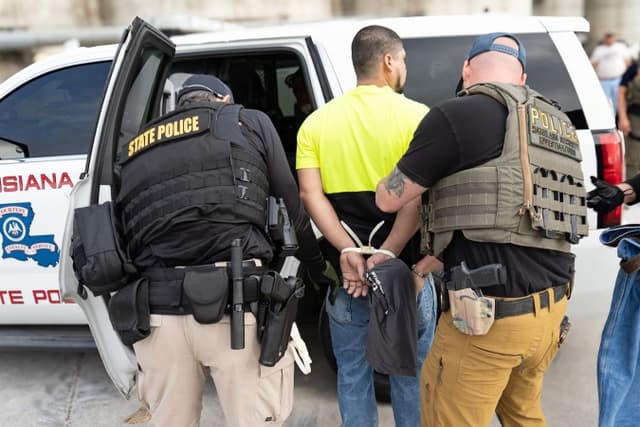
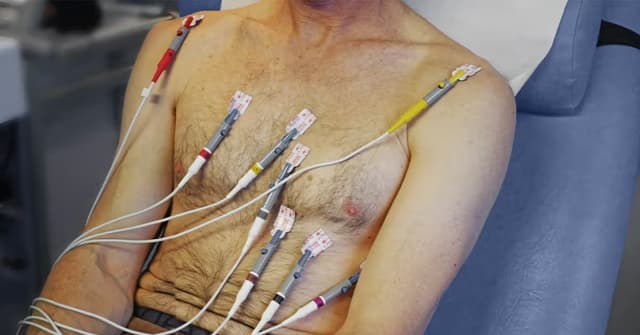
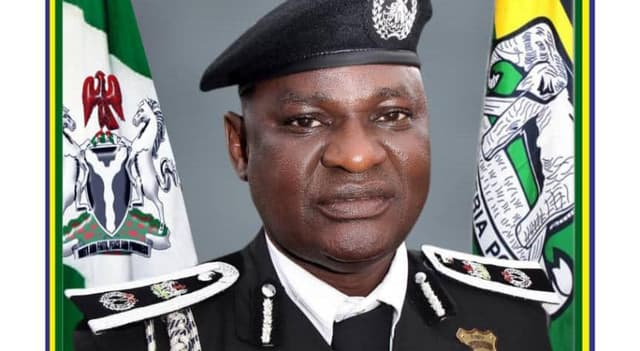

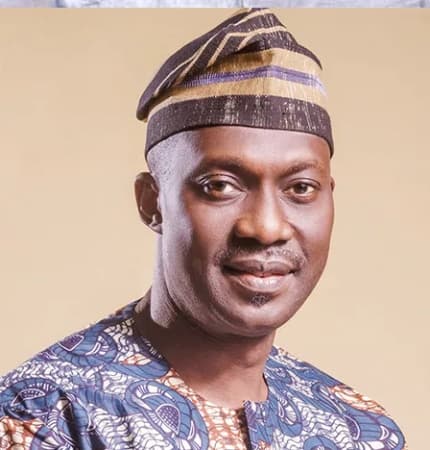
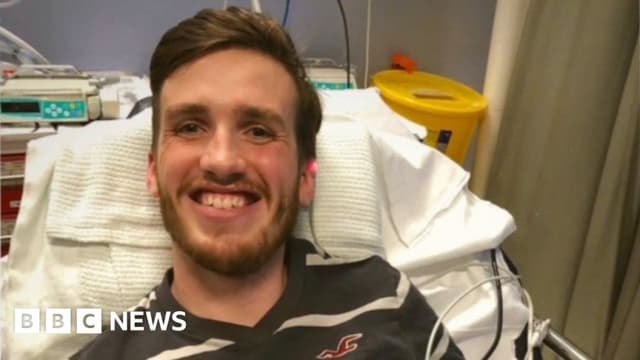
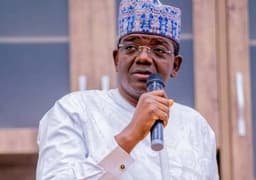

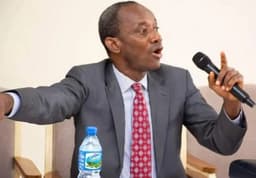
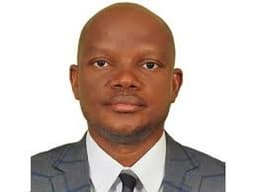
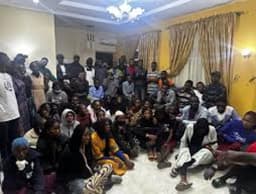
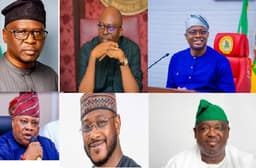
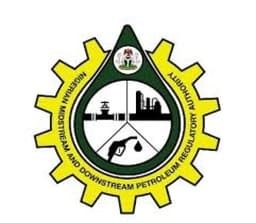
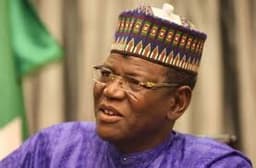













NEWS EXPRESS is Nigeria’s leading online newspaper. Published by Africa’s international award-winning journalist, Mr. Isaac Umunna, NEWS EXPRESS is Nigeria’s first truly professional online daily newspaper. It is published from Lagos, Nigeria’s economic and media hub, and has a provision for occasional special print editions. Thanks to our vast network of sources and dedicated team of professional journalists and contributors spread across Nigeria and overseas, NEWS EXPRESS has become synonymous with newsbreaks and exclusive stories from around the world.

INEC Chairman, Prof Yakubu
The Independent National Electoral Commission (INEC) on Wednesday voiced concern over its inability to sanction political parties, candidates, and their supporters who engage in premature campaigns ahead of elections.
INEC Chairman, Prof. Mahmood Yakubu, and Chairman of the Electoral Institute, Prof. Abdullahi Abdu Zuru, expressed this frustration during a one-day roundtable themed “Challenges of Premature Political Campaign.”
Prof. Yakubu explained that while the Electoral Act prescribes a fine of N500,000 for campaigns conducted less than 24 hours to an election, there are no sanctions for campaigns carried out before the 150-day window stipulated by the 2022 Electoral Act.
He noted that Section 94(1) of the Act prohibits campaigns earlier than 150 days before polling and requires them to end 24 hours before election day, stressing that the intent is to prioritise governance over constant electioneering.
Despite these provisions, he observed that parties and candidates remain in perpetual campaign mode, often before INEC even releases an official timetable for elections.
He said, “Around the country, we have seen outdoor advertising, media campaigns and even rallies promoting various political parties and candidates. These actions and activities undermine the Commission’s ability to track campaign finance limits as politicians, prospective candidates and third-party agents expend large amount of money that cannot be effectively monitored before the official commencement of campaigns.
“Quite correctly, Nigerians expect INEC, as registrar and regulator of political parties to act in the face of the brazen breach of the law on early campaign. However, the major challenge for the Commission is the law itself.
“Sections 94(2) of the Electoral Act 2022 imposes sanctions, albeit mild (a maximum amount of N500,000 on conviction), on any political party or a person acting on its behalf who engaged in campaigns 24 hours before polling day.
“However, there is no sanction whatsoever concerning breaches for campaigns earlier than 150 days to an election. Here lies the challenge for the Commission in dealing with early campaign by political parties, prospective candidates and their supporters.
“In a sense, the problem of early campaign in Nigeria is not new. The seeming inability of the Commission and other regulatory agencies to deal with the menace within the ambit of the existing electoral legal framework calls for deep reflection.
“It is in this context that the Commission considered it appropriate to convene this meeting in which legislators, leaders of political parties, civil society organisations, experts, practitioners and regulators will brainstorm on the way forward.
“Similarly, as the National Assembly is currently reviewing our electoral laws, the Commission has also invited the leadership of both the Senate and House of Representatives Committees on Electoral Matters.
“I am confident that they will give due consideration to actionable recommendations by experts, leaders of political parties, the President of the Nigerian Bar Association (NBA), the Broadcasting Organisation of Nigeria (BON), the National Broadcasting Commission (NBC) which regulates the broadcast media and the Advertising Regulatory Council of Nigeria (ARCON) which regulates advertisement, including outdoor advertising”.
He stressed the Commission’s strong belief that protecting the nation’s electoral process and consolidating it’s democracy is a multi-stakeholder task.
Chairman of the Board of The Electoral Institute and National Commissioner, Prof Abdullahi Abdu-Zuru expressed concern about the resort to early campaign by the political class in breach of the laws of the land.
He said even though Nigeria’s democracy is still in transition, it faces serious challenges like every evolving system, adding that One of the most worrying challenge faced by the commission is the increasing resort to early campaigns by political actors and their surrogates in many forms.
He said, “We have seen aspirants use cultural festivals and religious gatherings to drop hints about their ambitions, often disguised as appreciation or philanthropy. Billboards and branded vehicles sometimes appear with cleverly crafted slogans that stop just short of open solicitation but leave little doubt about the intent.
“More recently, social media influencers and content creators have become key players and fronts, flooding platforms such as Facebook, Instagram, Tik-Tok, YouTube, and X with songs, skits, and hashtags that project particular aspirants many months before the permission of the law.
“The Electoral Act 2022 is clear on this matter. Section 94.—(1)”for the purpose of this act, the period of campaigning in public by every political party shall commence 150 days before polling day and end 24 hours prior to that day.
“This safeguard was introduced to ensure fairness, reduce political tension, and guarantee a level playing field for aspirants. Unfortunately, what we see today is an increasing determination to circumvent, stretch, and even undermine this law.
“Often, third-party actors such as associations, professional groups, religious groups or political support groups are used as convenient fronts for disguised early campaigning.”
He stressed that the implications of this trend are far-reaching, saying “when aspirants or parties compete to dominate visibility long before the official campaign period, it distorts fairness and raises the cost of political competition.
“Moreover, It distracts from governance, as elected officials become more concerned with sustaining political relevance than delivering public service. Over time, it erodes public confidence in our electoral system and fuels cynicism about whether the law can truly be enforced.
“We must be frank in acknowledging the scale of the challenge and bold in designing solutions. We must refine the regulatory framework so that what constitutes premature or early campaigning is more clearly defined in today’s digital age.
“We must strengthen enforcement, ensuring that violations are detected early and sanctioned firmly, be it by political parties, individuals, or their proxies. We must engage media organizations and social media platforms, encouraging them to cooperate in moderating content that undermines the electoral timetable.
“We must intensify civic education to enlighten citizens, especially the youth, on the dangers of endorsing and promoting early campaigns.
“Democracy thrives on fairness, order, and respect for the rules, regulations and guidelines governing the electoral process. Campaigns conducted within the timeframe stipulated by law ensure a more level playing field, reduce political tension, and enhance the credibility of elections.
‘Respecting the law is not a limitation on political participation but an affirmation that our democracy is rooted in integrity, not expediency”.
Chairman of the House Committee on Electoral Matters queried why the nation should be seeking to limit campaign period while wondering what would likely constitute early campaign by politicians.
He said while there are no elections free from campaign, the question to ask is what constitute early campaign for elections, especially ahead of the 2027 elections.
“Is it when the government is commissioning a project and his supporters gather to sing his praises and show appreciation or when a lawmaker go to empower his constituents or when the opposition hold rallies to oppose government policies.
“We should search our minds whether wr should be having laws in 2025 restricting campaigns. We should put behind us, these practices we inherited from the military and forge democratic ideals going forward.
“The social media today cannot be controlled and sometimes, you don’t even know who is putting out posters on your behalf. So, who do you hold responsible when things like this happen? Is it the individual or the political parties”.
The Inspector General of Police, Kayode Egbetokun, also raised the question of whether political campaigns should be regulated, adding that the existing explanation is the need to bridge the gap between leaders and the people in terms of governance.
Represented by the Commissioner of Police in charge of election monitoring, Adebayo Sogunle, the IGP said every law enforcement agency is saddled with the responsibility to ensure implementation of all laws passed by the National Assembly.
He said In doing that, the question has always been the relevance of such laws to the security and welbeing of the people and the nation.
He said the Nigeria Police Force will continue to enforce all laws and will continue to do what need to be done to ensure peaceful campaign for all elections, while also ensuring adequate security through election periods. (The Nation)